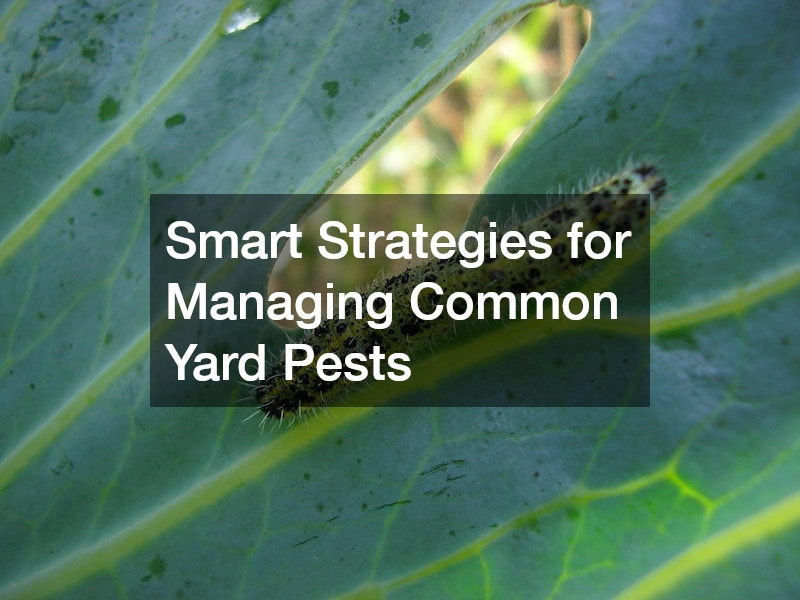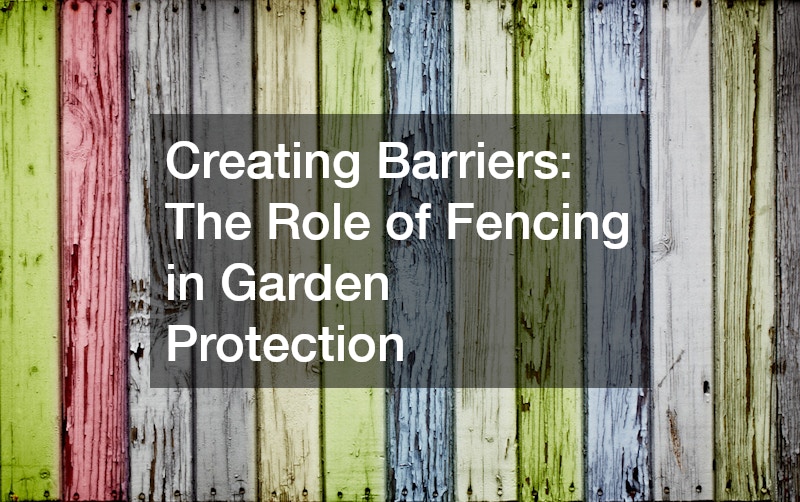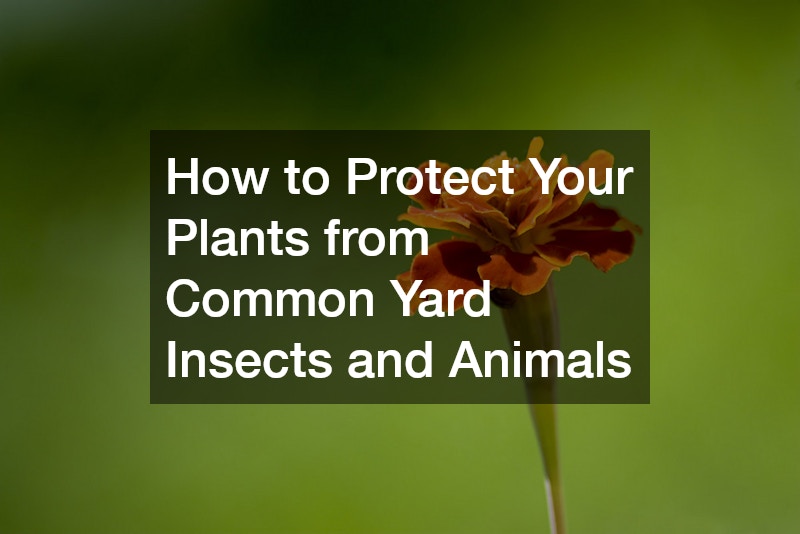Maintaining a healthy and vibrant garden requires more than just regular watering and sunlight. Garden enthusiasts understand the importance of managing common yard insects to ensure that their plants thrive throughout the seasons. These tiny invaders can cause significant damage if not addressed promptly and efficiently.
With the variety of pests that can attack your garden, employing smart strategies for pest control becomes essential. Professional pest control services are often recommended for stubborn infestations, but many yard owners prefer to start with natural solutions. In this comprehensive guide, we’ll explore smart strategies, when to seek professional help, and how to work with local experts.
Additionally, we’ll cover sustainable practices for enhancing your lawn’s health, tree maintenance, and more. Collaborating with a local landscaper or arborist can offer surprising benefits for garden vitality. Let’s delve into the different aspects of garden care that can help shield your plants against pests, ensuring your garden remains a source of pride and delight.
Smart Strategies for Managing Common Yard Pests

Understanding the lifecycle and behavior of common yard insects is the first step in managing them effectively. Integrated Pest Management (IPM) is a strategy that combines different management approaches for better results. Techniques include mechanical control, biological methods, and the judicious use of chemical treatments.
Encouraging beneficial insects like ladybugs and praying mantises in your garden is a great natural approach. These insects can help control aphid populations and other harmful pests, minimizing damage to your plants. Maintaining a diverse ecosystem in your garden can deter significant pest invasions naturally.
Regular inspections and early detection of pest issues can prevent the need for extensive treatments. Setting up traps and barriers can also be a proactive method, capturing pests before they have a chance to cause damage. Employing pest control services is advisable if infestations become unmanageable through DIY methods.
Signs You Might Need Professional Help for Plant Protection
Identifying when professional intervention is necessary can save both time and money in garden maintenance. Yellowing leaves, stunted growth, and visible infestations are clear indicators of pest issues. When symptoms persist despite initial home treatments, it’s time to consider pest control services.
Severe cases of pest invasion often require specialized knowledge and equipment that professionals possess. Insect populations that spread rapidly can overwhelm homeowners, indicating the need for professional care. Professionals can assess the severity of the problem and develop a tailored plan for your garden’s needs.
Additionally, if you’re inexperienced in handling the chemicals necessary for pest management, it’s best left to trained experts. Pest control services have the expertise to safely apply treatments with minimal risk to your family and pets. Ensure you consult with reputable companies that can provide a comprehensive solution tailored to your garden.
Collaborating with Local Experts for a Healthier Garden

Working with local experts such as a local landscaper or an arborist can greatly enhance garden health. These professionals possess knowledge of regional pest and plant varieties, allowing for more effective pest management. Consulting them can offer insights into preventative measures and sustainable practices.
Local landscapers can provide tailored lawn services, including regular mowing, aeration, and fertilization. These practices not only improve lawn aesthetics but also promote natural pest resistance. A robust, healthy lawn is less susceptible to damage from common yard insects.
Arborists specialize in tree services and can assess your garden’s tree health, identifying signs of pest infestation early. Regular tree maintenance can prevent pest breeding in decaying wood and manage canopy density. Collaborating with these experts can provide holistic plant health solutions and minimize reliance on chemical controls.
Tips for Enhancing Your Lawn’s Health to Deter Pests
A well-maintained lawn is an effective deterrent against common yard insects. Regular mowing keeps grass at an optimal height, reducing the habitat available for many pests. Proper mowing also encourages denser grass growth, which helps choke out weeds that can harbor pests.
Aerating your lawn annually is essential for promoting root growth and nutrient absorption. Better-aerated soil reduces compaction and improves drainage, creating an unfavorable environment for pests. Utilizing natural fertilizers can enhance soil health without the adverse effects of chemical treatments, supporting lawn vitality.
Watering habits also play a critical role; overwatering can lead to pest proliferation by creating a hospitable environment for certain insects. Smart irrigation systems can help maintain ideal moisture levels, thereby promoting healthy growth and natural pest resistance. Consulting a local landscaper for lawn services ensures proper implementation of these strategies.
How Tree Maintenance Can Benefit Your Plant Health
Trees are integral to your garden ecosystem, offering shade, structure, and habitats for beneficial wildlife. However, they can also become breeding grounds for common yard insects if neglected. Proper tree maintenance ensures trees remain healthy, reducing the likelihood of pest problems.
Regular pruning helps maintain tree health by removing dead or diseased branches where pests thrive. It also improves air circulation, reducing conditions that favor fungal infections and pest infestations. Engaging tree services from a certified arborist can ensure that pruning is done correctly.
Soil management around trees is equally important; compacted soil hinders root growth and water absorption. Applying a layer of organic mulch can enhance soil quality, providing essential nutrients as it decomposes, while also serving as a barrier against pests. Consistent tree care minimizes insect infestation risks and promotes overall plant health.
Creating Barriers: The Role of Fencing in Garden Protection

Fencing is an often-overlooked element that plays a crucial role in protecting gardens from animal intrusions and rogue insects. Physical barriers can deter larger animals that may cause significant plant damage. Fence companies can customize solutions to match your garden’s aesthetics and protection needs.
Strategic fencing can also support pest management by blocking pathways common yard insects use to access garden beds. Consider using mesh fences with fine openings to prevent insects from entering while allowing airflow and sunlight. Regular fence maintenance is crucial to ensure its effectiveness as a deterrent.
When planning a fence, it’s a good idea to consult professionals who can identify the best style and materials for your specific pests and garden layout. Effective barriers not only keep pests at bay but also provide added security to your overall yard layout. Trustworthy fence companies can offer long-lasting solutions that enhance both utility and garden aesthetics.
Consulting Professionals for Optimal Plant Care Solutions

Consulting professionals can provide practical and specialized solutions for managing common yard insects. Whether facing a recurring pest problem or needing advice on preventative measures, professional guidance is invaluable. Expert consultations can tailor approaches based on your garden’s unique characteristics.
Pest control services specializing in eco-friendly options can offer alternative strategies to chemical pesticides. These services might include biological pest control, where natural predators are introduced to manage insect populations. An experienced local landscaper can then provide insights into incorporating these strategies into your existing lawn care routine.
Moreover, consulting with garage door repair specialists can prevent pests from entering adjacent indoor areas like garages. Keeping garages secure and tidy with the help of pressure washer services and junk removal can reduce potential hiding spots for insects. Trust in professionals to ensure your home and garden are both protected and well-maintained.
Seasonal Maintenance Tips to Keep Your Garden Safe
Adapting your garden care routine to seasonal changes is essential for effective pest management. Each season comes with specific pest challenges and maintenance requirements that garden owners should address. For instance, springtime involves preparing plant beds and adjusting soil pH after winter.
During summer, focus on pest prevention through regular monitoring and applying natural deterrents. Incorporating companion planting during these months can bolster plant health and resist insect attacks more effectively. As autumn approaches, begin soil treatments and mulching to prepare for colder temperatures.
Winter is ideal for comprehensive garden clean-up and assessing plant coverage to protect against frost. Regular seasonal updates can prevent pest buildup and ensure your garden is continuously thriving. Consulting with lawn services or a local landscaper before each season change can enhance your garden’s defense mechanisms naturally.
How Regular Cleaning Can Contribute to Plant Health
A clean garden is less inviting to pests and promotes overall plant health. Mulching, pruning, and debris removal are part of an effective maintenance routine. Professional junk removal services can assist in clearing large or awkward waste piles, ensuring your garden remains tidy and pest-free.
Keeping garden tools clean and stored properly also deters pests from being transferred between plants. Regular maintenance using a pressure washer can also remove bacterial build-up on outdoor surfaces, contributing to a healthier environment for your plants. Establishing a consistent cleaning schedule is crucial for proactive pest management.
Ultimately, a clean garden reduces the hiding spots and breeding grounds for common yard insects. It allows for easier monitoring and will help identify early signs of pest problems. Investing in cleaning equipment or services can provide long-term benefits for your garden’s beauty and health.
Planning Your Yard Layout for Natural Pest Resistance
Consideration of yard layout is a vital component in naturally deterring pests. Thoughtful garden design can minimize pest-friendly areas while maximizing plant health and ecosystem balance. Diverse planting schemes ensure that beneficial insects thrive while discouraging pest populations.
Implementing companion planting principles can enhance natural resistance by maximizing beneficial plant relationships. For instance, planting herbs that repel common insects near vulnerable plant species can be an effective strategy. A local landscaper can assist in designing a layout that incorporates these methods efficiently.
Designing garden pathways and mulched borders can also interrupt pest movement and facilitate maintenance. Incorporating windbreaks and strategically positioning taller plants can further deter certain pest species. Effective planning not only enhances garden aesthetics but significantly contributes to long-term pest control.
The Importance of Monitoring Your Garden’s Ecosystem
Regular monitoring of your garden’s ecosystem is vital in preventing and managing pest invasions. Keeping track of beneficial insect populations and plant health provides a comprehensive view of your garden’s well-being. Observing changes over time allows for timely adjustments in your pest management strategies.
Electronic monitoring systems can provide real-time data on pest activity and environmental changes. These systems can alert you to potential threats, empowering you to take swift corrective action. Consulting with a local landscaper for professional insights can augment these monitoring efforts.
Moreover, understanding your garden’s ecosystem supports informed decision-making regarding chemical and natural pest control options. Record-keeping can identify trends and help predict future pest challenges, ensuring preparedness year-round. Achieving balance within your garden’s ecosystem is foundational to sustainable gardening practices.
Effective Companion Planting to Deter Common Yard Threats
Companion planting is an age-old technique that leverages the natural properties of certain plants to dissuade pests. For example, planting marigolds with tomatoes can help prevent nematode infestations. Pairing plants with natural pesticide qualities can eliminate the need for synthetic chemicals.
Combining aromatic herbs like basil and mint in your garden can confuse many common yard insects. The scent from these plants acts as a repellant, keeping them away from more susceptible crops. Companion planting encourages biodiversity and strengthens the resilience of your garden ecosystem.
Furthermore, using pest-deterring plants strategically within your garden’s layout can create a more cohesive pest control strategy. It serves as a natural line of defense that integrates seamlessly with environmental health. Learning about effective pairings and placements from gardening books or landscapers can amplify these benefits.
Simple Changes to Protect Your Plants from Animals
Protecting your garden from larger intrusions requires different strategies than insect control. Simple modifications, such as using netting or chicken wire, can effectively protect crops from rabbits and deer. Animal removal services can provide guidance if wildlife poses a significant threat to your garden.
Encouraging natural predators, like birds, to visit your garden can also help control both animal and insect pests. Installing bird feeders and baths creates a welcoming environment without necessarily invading your plants’ space. Additionally, reducing excess vegetation can help eliminate habitat options for unwanted animals.
Employing scare tactics such as reflective objects or noise-making devices can sometimes discourage animals from approaching garden areas. Adapting your gardening practices seasonally ensures your strategies align with local wildlife activity. Ensuring garden security while maintaining harmony with nature elevates both garden health and satisfaction.
In conclusion, managing common yard insects and maintaining plant health requires a holistic approach. From strategic garden designs to employing the help of professional services, each step contributes to a more resilient and flourishing garden. Collaborating with local experts, utilizing sustainable practices, and developing a resistant garden ecosystem are key elements in this process.
Regular monitoring and timely interventions prevent minor issues from escalating into significant problems, safeguarding your investment in garden care. By incorporating various techniques—from pest control services to companion planting—the potential for a vibrant, pest-resistant garden can be achieved. Embracing both traditional and modern methods cultivates a harmonious and thriving gardening environment.
As we protect our gardens from pests while supporting ecological balance, we affirm our commitment to sustainable and enjoyable gardening. Exploring these practices ensures you are equipped with the knowledge and tools necessary for optimal garden health. May this guide serve as a mindful resource in your journey towards a pest-free, healthy garden.
